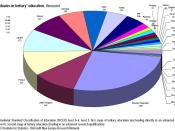In the first half of the nineteenth century the general education status did not yet correspond to the needs of the industrial modern time. In enlightened France and economical Great Britain the population consisted of almost 50 per cent of illiterates. The art of reading and writing was only tried to mediate to all layers of the population in Scandinavia, the Netherlands and in Germany. In Prussia and other German states it was obligatory to attend primary school from the age of six to fourteen. This teaching was supposed to mediate basic knowledge. Only those who could afford it sent their children to secondary education, like the Gymnasium or the Oberrealschule, where the school leaving examination, the Abitur, could be attained. This secondary education was not free of charge. Thus it was frequently reserved for the children of the aristocracy and wealthy merchants. The lower and middle class families, who could not afford to send their children to secondary education, had a little chance with the charity system.
Scholarships were given to low income students by churches or wealthy merchants. Government investment started to rise slowly throughout the decade, but was it a good investment for all layers of the population? This essay aims to describe the positive and negative impacts of the investment for the education in nineteenth century Europe using the examples of Germany and France. The discussion that follows is broken down into four sections: The first section describes the different institutions in the educational system followed by an explanation of the ascendancy of the government. The next section declares the changes which took place in nineteenth century Europe. The closing observations present whether the increased investment had a positive or negative impact on the education system for all layers of society.
The general education system...


